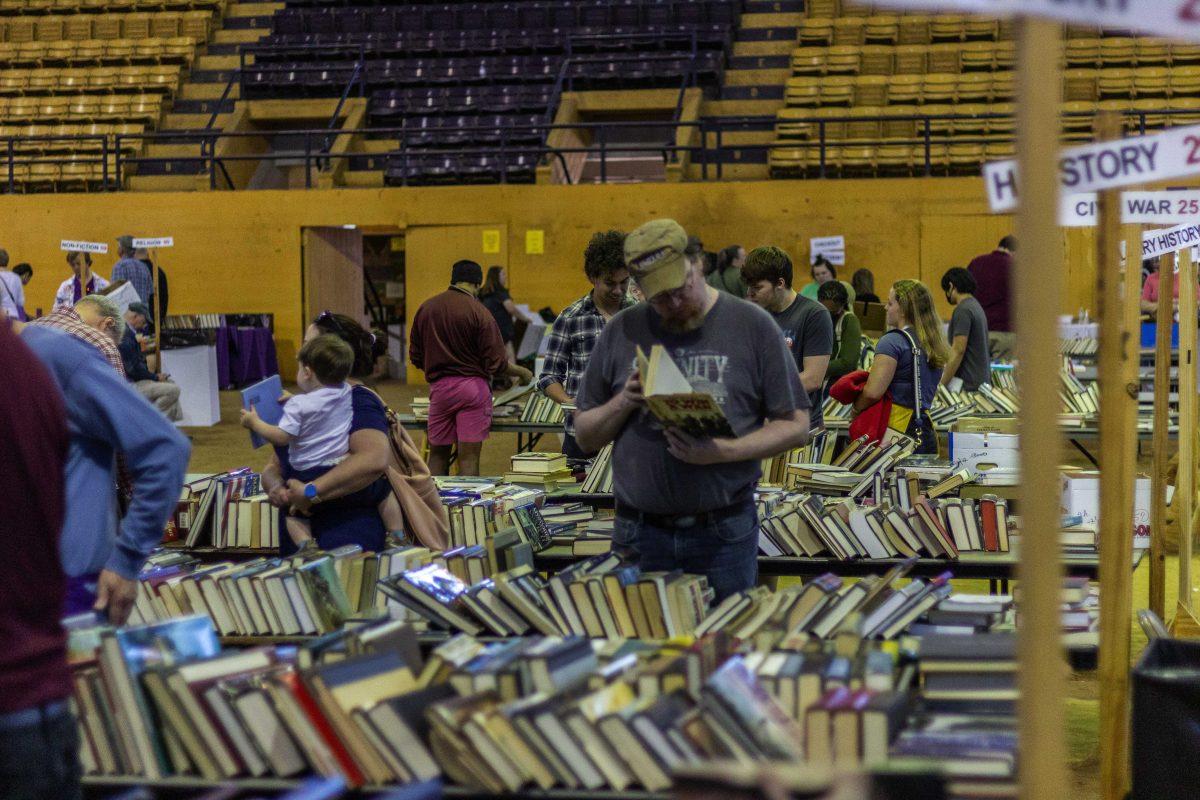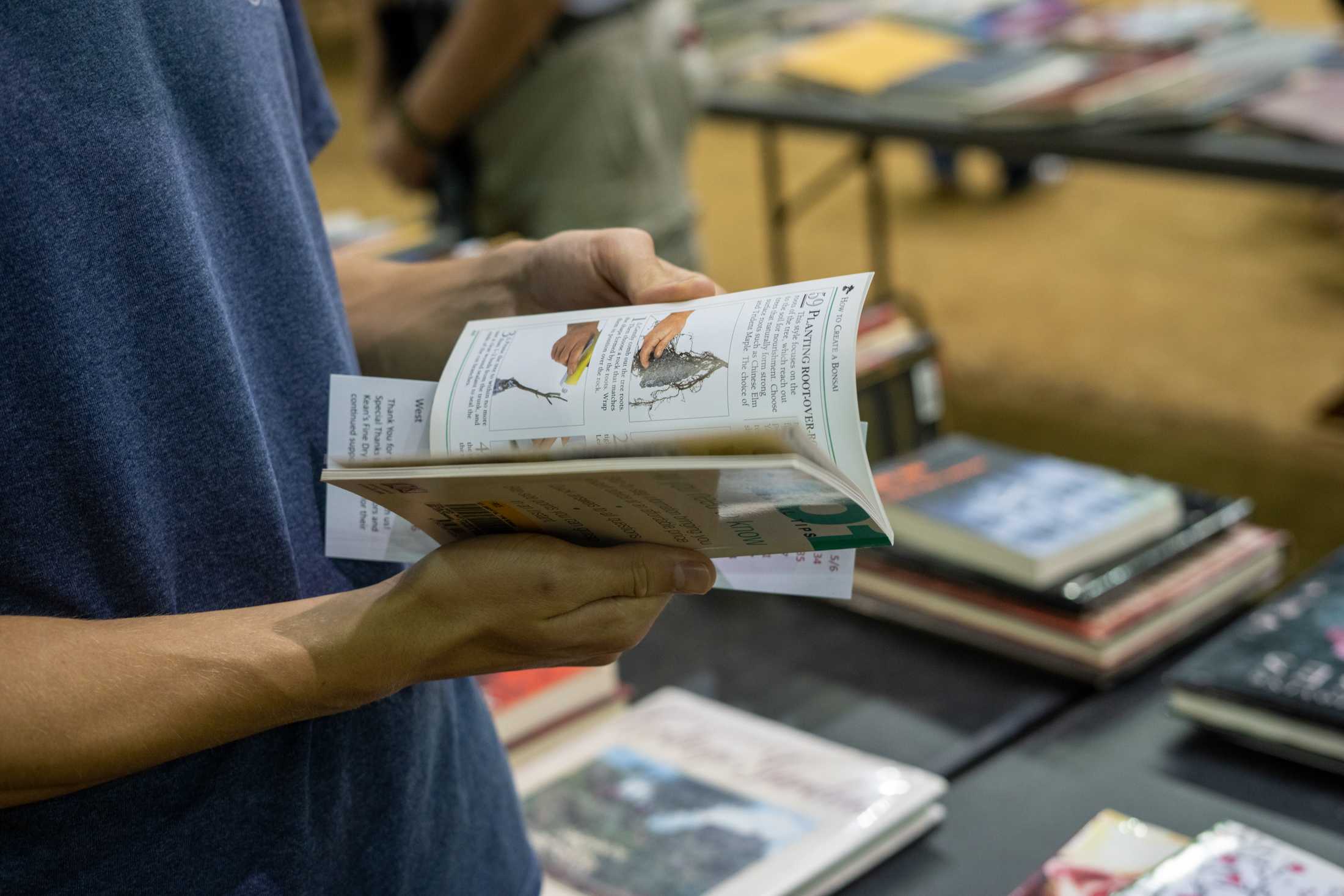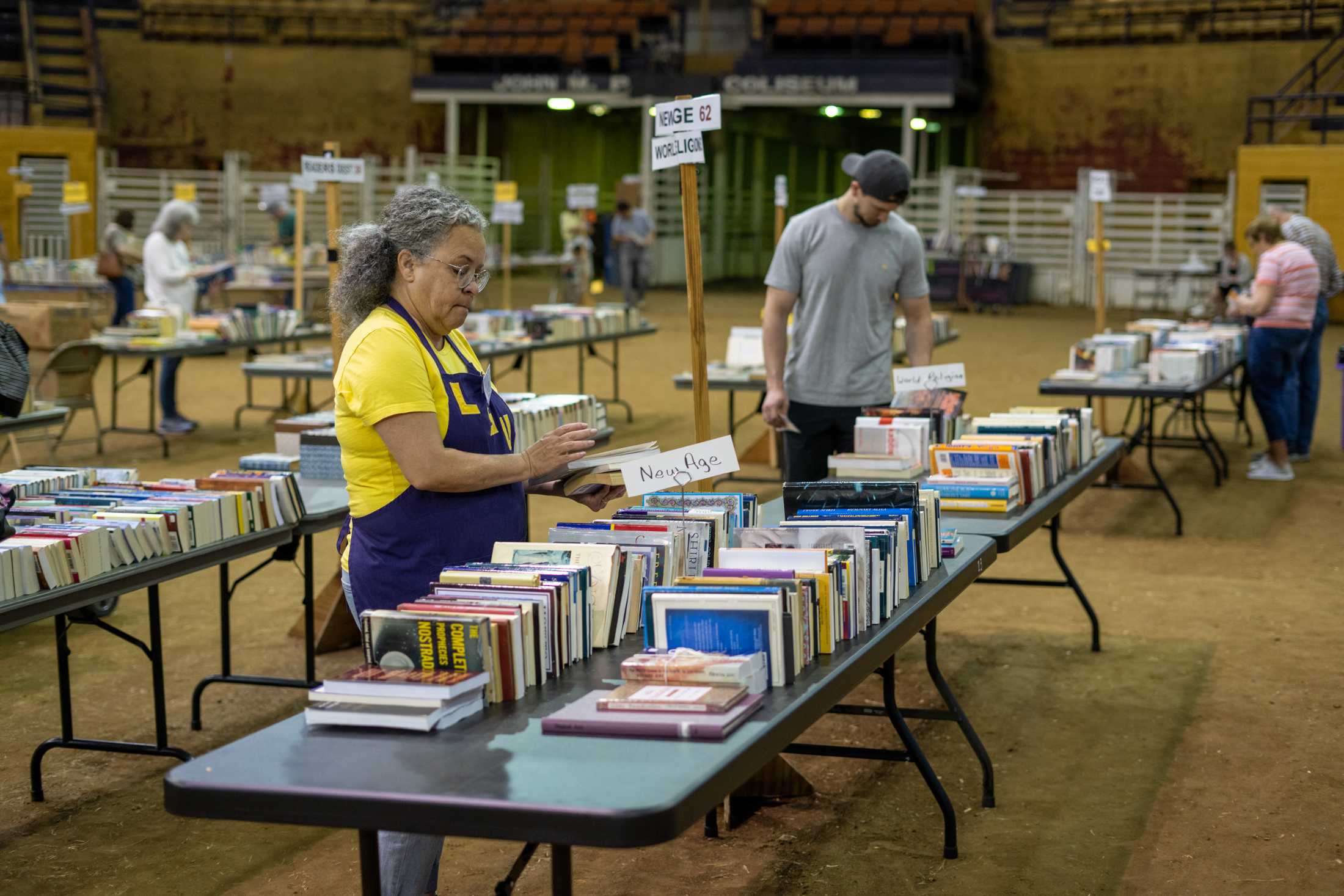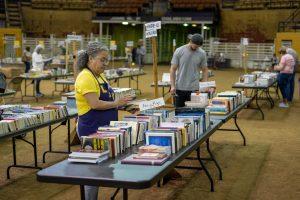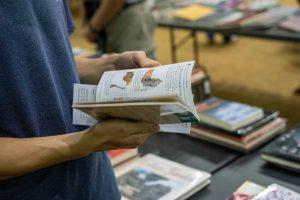In the John M. Parker Agricultural Coliseum, a bazaar sprung from the red dirt floor.
The stands were empty, but the pit was full. Tens of thousands of books lined banquet tables, arranged into rows, organized into sections like Mystery, Medicine and West. Among the spiral bounds, staple bounds, leather bounds and paperbacks, collections of people sifted through unknown volumes, searching for exactly what they couldn’t tell you, though often finding something of themselves in the sea of pages.
This is the Book Bazaar: a fundraiser held each spring for the benefit of LSU’s libraries.
Organized by non-profit, “Friends of the LSU Libraries,” this year the bazaar opened its doors from April 13-16, seeing hundreds of visitors, raising tens of thousands of dollars and selling upwards of 60,000 volumes—all of which were donated by the community.
“It’s pretty amazing because every year we think we won’t be able to find any more books,” said Bazaar Chairman Anita Adams on the fundraiser’s second day. Yet each year, the donations come in masses.
“It’s avid readers who just have a whole lot of books that they need to clear out. It’s professors who retired, and we get their entire libraries from their offices at LSU. It’s generational book collectors who’ve kept them through the decades, and years and years, and then something happens, and they have to downsize,” Adams said.
The community donates its books. Then it returns for them. Avid readers, professors and collectors give to The Friends, then The Friends give the same books back, this time to new readers, professors and collectors. It’s a cycle.
And this year, the cycle was bigger than usual.
“We had people lined up at the front door, all the way around the building, before 9 o’clock,” Adams said. A video on her phone showed the crowd on Thursday morning. They waved at the camera, hooting and smiling in anticipation.
Each year, the bazaar connects books with people and often in serendipitous fashion.
“You don’t know what’s on that table,” Adams said. “I had a man bring this book to me—very nondescript—he said, ‘I have been looking for this book for 15 years’. . .He was so happy.”
The bazaar’s rare and collectible section also drew considerable attention.
“There was a huge crowd of 20 dealers here picking as fast as they could,” said volunteer Luis Interiano of the first day. Interiano, who works as a reference librarian for the West Baton Rouge Library, wore a mesh pith helmet with a battery powered fan as he stood at the collectibles section, pointing out interesting titles and delving into the finer points of valuation.
Most notable among the rare books was a mint condition, multi-volume set of English writer Sir Walter Scott’s Waverley novels.
“As a librarian,” said Interiano, “I like people to use their books and read their books, but I was excited to see a set that had probably never been touched in 130 years because it was in such perfect shape.”
The volumes sold for $270, in all.
The priciest title at the book bazaar, however, was a signed copy of Jerry Tompkins’s, “D-Days at Dayton: reflections on the Scopes trial”—which, at $200, hadn’t yet sold by the second day.
This year’s strangest title was likely an early edition of Adolf Hitler’s “Mein Kampf”—which a historian snagged early on.
“I wasn’t sure if it would sell, because some people might not want to be walking around with Hitler’s book, you know?” Interiano lifted the fan-hat from his head and wiped his brow. “Of course, we have Mein Kampf on the shelves at my library, and sometimes people say, ‘Why do you have this? It’s not a good book.’ My view, as a librarian, is that we have to teach the mistakes of the past.”
The bazaar has a way of drawing out surprising conversations. There is, after all, a wealth of source material to be found among the tables.
On the last day, LSU senior Lacy Wendell managed to fill a whole box with titles—nearly every one of them in French. When she graduates in May, Wendell, who majored in the language, will be traveling abroad to work as an au pair in a French-speaking household.
“I don’t know what any of them are about,” she said, eyeing the books, “but I’ll find out once I start reading.” On one cover, a white horse ran across the title. Another glowed red in the Coliseum lights.
Arabi resident Joshua Anderson also came for the bazaar’s last day. And though by that time the tens of thousands of books had dwindled to just a few, Anderson managed to fill a box too.
“My wife and I are here because we love to read,” he said, smiling. His beard bobbled when he spoke, “It’s our first time here.”
Among the picks in his box, Anderson was most excited about a book called, “Answers to Distractions.”
“It’s co-written by an author who’s written another book we’ve read,” Anderson said, gesturing to his wife, who was searching intently at a table nearby. “It’s about ADD, and the reason I chose it is because I have ADD. Undiagnosed.”
Anderson scanned the rest of the titles in his box. A few history books. Two or three works of fiction. “All of the other ones seem interesting in their own ways,” he said, returning to the hunt.
At the end of the day, half a dozen people shuffled between the last few tables in the coliseum. From the crackle of a megaphone, a volunteer alerted the hangers-on that the bazaar would be closing in twenty minutes.
Once again, the community had come back for their books, absorbed them, leaving only a handful of dusty reads, the skeletal remains of the banquet tables and the piles of boxes in which the vast majority of the books, now gone, had been transported to the coliseum.
Over the next year, The Friends of the LSU Libraries will receive donations at their warehouse on River Road. The community will give books until it’s time for the next bazaar, where they’ll be absorbed once more, starting the cycle anew as so many cycles begin — with the spring.
For those who like to read, who enjoy the search, who want to be surprised: Keep in mind the Book Bazaar. Whether you know it or not, something likely waits for you among the tables. Go and see.


